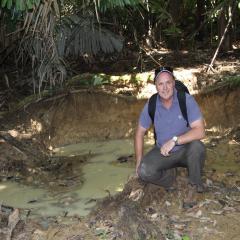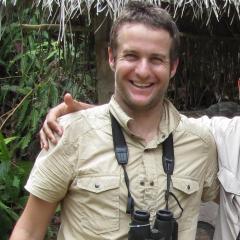View a short video by Romina Castagnino Vera with camera work by Thomas Lloyd about Steve's work on Javan rhinos:
CBCS PhD student Steve Wilson embarked on an adventure in January 2015, when he began an examination of the factors impacting the long-term survival of the rare and highly threatened Javan rhino, Rhinoceros sondaicus. Steve’s PhD in the School of Biological Sciences involves novel research that connects ecological, behavioural and human-related factors relevant to the rhino’s conservation. A single small population of 72 Javan rhinos is all that remains globally, with all individuals located on the western tip of Java, Indonesia, in Ujung Kulon National Park. The genesis for this work was 1967, when Steve was just eight years old and heard that a photographic team was planning to visit Ujung Kulon National Park to try and photograph Javan rhinos in colour for the first time. At that time, only an estimated 27 animals were in existence. The troubled fate of Javan rhinos stayed with Steve for 50 years, ultimately leading to him taking up this study of them in the wild.
Protecting rhinos and their habitat
Steve has spent long periods in the remote Javan rainforest under the guidance of Ujung Kulon National Park rangers and rhino protection unit staff, who spend an average of 20 days per month in the field protecting the rhino and other Endangered species from a range of existential threats, including poaching, human encroachment and impacts on habitat from an invasive palm.
Steve’s PhD helps advance conservation outcomes for this unique and Critically Endangered animal by:
- examining the awareness of local people living near Ujung Kulon National Park about Javan rhino conservation and its implications for future conservation measures
- determining the approaches and attitudes of rhino protection staff and national park staff in rhino management, with the implications of these for future management
- looking at how to best manage arenga palm on rhino habitat and examining rhino food plants
- studying the characteristics of Javan rhino wallows, including undertaking spatial analysis of wallows and their importance to rhino ecology, and taking these data into account for future conservation planning
- examining the rarely studied and data-deficient area of Javan rhino social interaction and communication behaviour.
Understanding rhino behaviour
This important work will improve our current understanding of the factors shaping the conservation of Javan rhino. Its impact will lie in increasing awareness of the effectiveness, data gaps and future risks of current conservation initiatives, and enhancing knowledge of Javan rhino ecology and social behaviour. It will also create impact by optimising the management of key threats to this rare animal, like the invasive arenga palm.
Direct observation of the Javan rhino is extremely difficult due to its rarity and remote rainforest habitat; consequently, our knowledge of its social behaviour and communication remains limited. To increase our understanding, Steve analysed 392 remote camera trap videos. Altogether, 11 behavioural patterns were categorised, which relate to daily activities. Steve also expanded our knowledge of Javan rhino vocalisation via 55 recordings comprising 196 individual vocalisations, identifying eight vocalisation descriptors with accompanying sonograms – a first for the species.
Supervision: Professor Salit Kark, Dr Duan Biggs and Associate Professor Anne Goldizen.
Forthcoming papers
Wilson, S.G., Hockings, G., Deretic. J.-A.M., and Kark, S. More than just mud: The importance of wallows to Javan rhino ecology and behaviour. Pachyderm (accepted 29/02/2020).
Wilson, S.G., Biggs, D., and Kark, S. Protecting an icon: Javan rhino frontline management and conservation. Oryx (accepted 12/11/2019).
Photo: Steve Wilson/Ujong Kulon National Park Authority



